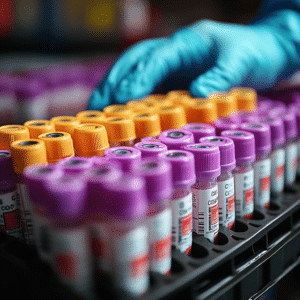Understanding Faith-Based Recovery in 2024
Faith-based recovery programs have gained significant traction in the field of addiction treatment. These programs integrate spiritual principles with traditional therapeutic approaches, aiming to provide a holistic path to recovery. This dual approach, combining faith and therapy, offers a comprehensive support system for individuals battling addiction. In 2024, faith-based recovery has become a crucial component of addressing the persistent addiction crisis that many families face, as the heroin addiction epidemic continues to devastate communities.
Faith-based recovery isn’t a new concept, but its growing recognition highlights its efficacy and unique benefits. As our society leans more on digital connections, the personal touch of faith-based programs resonates deeply, offering a beacon of hope and community for those in dire need.
The Core Components of Faith-Based Recovery Programs
Faith-based recovery isn’t just about religious teachings; it encompasses a variety of elements that work together to foster healing and growth. Programs like Celebrate Recovery and Teen Challenge illustrate how these components are implemented in real-world scenarios. Here are some vital elements:
1. Spiritual Counseling and Guidance
Spiritual counseling provides an anchor for individuals dealing with addiction. Programs like Celebrate Recovery offer pastoral care and spiritual mentoring to help participants explore their faith and how it can guide their recovery. This process often involves personalized one-on-one sessions and group meetings centered on biblical teachings.
Moreover, spiritual practices have a profound impact on stress tolerance and emotional well-being. Incorporating faith into counseling sessions can help individuals build a sense of calm and optimism, essential for their recovery journey.
2. Community and Support Networks
A robust support system is central to faith-based recovery. Teen Challenge, for example, emphasizes building a sense of community among participants. Regular group meetings, fellowship events, and communal living experiences foster strong bonds. This connectedness can be a powerful motivator and support mechanism during the recovery journey, offering a sense of family that many struggling with addiction deeply crave.
Creating a community support network is also critical in recovery. Programs designed to help individuals build such networks ensure that no one feels isolated during their path to sobriety.
3. Structured Living Environments
Faith-based treatment centers often provide a structured living environment. The Salvation Army’s Adult Rehabilitation Centers (ARC), for instance, offer residential programs where routine and discipline are paramount. These environments replicate a family setting, which many individuals struggling with addiction find reassuring and stabilizing.
Structured living offers a predictable environment, helping individuals rebuild their lives within a secure framework. This structured setting can significantly reduce the chaos often associated with addiction.
4. Holistic Therapeutic Approaches
Faith-based recovery programs don’t shun traditional therapy; instead, they integrate it. The Hazelden Betty Ford Foundation incorporates evidence-based therapies within a framework that respects and includes spirituality. This blend can enhance the effectiveness of the treatment, addressing both the spiritual and psychological facets of addiction.
By combining spiritual guidance with therapies like cognitive-behavioral therapy (CBT) and motivational interviewing (MI), these programs offer a well-rounded approach to recovery.
| Aspect | Description |
| Definition | Faith-based recovery programs incorporate traditional substance abuse treatments within the framework of specific religious beliefs. |
| Approach | Combines counseling and therapy with religious teachings and wisdom from a particular faith. |
| Differentiation From Secular Programs | Secular 12-step programs acknowledge a higher power without aligning with any particular religion. Faith-based programs, however, integrate religious practices more directly into the treatment process. |
| Types of Programs | – Specific faith-based: Integrates religious practices and separates them from other treatment methods. – Interfaith: Incorporates elements from multiple religious traditions or focus mainly on general spirituality. |
| Literature | Faith-based recovery often utilizes sacred texts (such as the Bible for Christ-centered programs) and religious literature, whereas secular 12-step programs may use non-religious texts that still encourage spiritual growth. |
| Benefits | – Increased sense of community and belonging – Support from fellow believers – Greater optimism and tolerance to stress due to spiritual practices – Comfort from a sense of not being alone during recovery. |
| Counseling Focus | Addresses both addiction and spiritual well-being, aiming for holistic healing. |
| Stress Management | Regular religious or spiritual practices can enhance stress tolerance and promote a positive outlook. |
| Involvement of Families | Often includes family counseling and support, integrating family into the recovery process through religious teachings and community support. |
| Voluntarism | Religious practices in faith-based programs can be mandatory, partially integrated, or optional components depending on the specific program. |
| Programs Available | – Residential Inpatient Programs – Outpatient Programs – Group Therapy Sessions with religious components – One-on-One Counseling with faith-based focus. |
| Community Support | Emphasizes building support networks within religious communities and faith congregations. |
| Spiritual Techniques | May include prayer, scripture study, worship services, and other religious rituals as part of the recovery process. |
The Unique Benefits of Faith-Based Recovery Programs
Faith-based recovery offers distinct advantages that can significantly impact individuals on their path to sobriety. Let’s explore these unique benefits in more detail.
1. Sense of Purpose and Meaning
One of the primary benefits is the sense of purpose that individuals gain. Faith-based programs, such as those run by the Association of Christian Alcohol & Drug Counselors (ACADC), often encourage participants to find meaning and direction through their faith. This sense of higher purpose can be pivotal in sustaining long-term recovery.
By reconnecting with their spirituality, individuals often rekindle a sense of worth and direction that can sustain them through tough times.
2. Encouragement of Forgiveness and Redemption
Addiction often comes with guilt and shame. Faith-based programs like St. Christopher’s Inn focus on themes of forgiveness, redemption, and second chances. The process of spiritual reconciliation can alleviate the burdens of guilt, fostering a mindset conducive to recovery.
These programs emphasize the idea that everyone deserves another chance, which is particularly comforting for those feeling overwhelmed by their past actions.
3. Enhanced Emotional Resilience
Incorporating faith can enhance emotional resilience. Programs such as Hope Homes Recovery provide not only spiritual support but also life skills training and emotional counseling. By building emotional strength through prayer, meditation, and community support, these programs help individuals better cope with life’s stresses.
Emotional resilience is critical in recovery, helping individuals handle setbacks and continue progressing towards sobriety.
4. Long-term Community Support
Faith-based recovery often extends beyond the initial treatment phase. Many programs, including the sober living homes associated with the Calvary Recovery Center, maintain lifelong connections with alumni. These enduring relationships offer ongoing support, crucial for maintaining sobriety.
Continued support from a community that shares similar values and experiences provides a reliable safety net for individuals.
5. Encouragement of Altruism and Service
Engaging in acts of service is a fundamental principle in many faith-based recovery programs. Organizations like Rescue Mission Ministries involve participants in community service activities. This involvement not only aids personal growth but also helps cultivate a sense of gratitude and humility.
Service to others can provide a sense of purpose and connection, which are powerful motivators in the recovery process.
Real Success Stories: Transformations through Faith
Faith-based recovery has been life-changing for many. Consider the story of Russell Brand, who has spoken at length about how faith and spirituality played a critical role in his recovery journey. Similarly, faith-based initiatives have transformed communities, as seen with the work of organizations like Convoy of Hope, which leverages faith, hope, and community outreach to make significant impacts.
Case Study: The Impact of Teen Challenge
Teen Challenge, with its widespread network, illustrates the power of faith-based recovery. Numerous graduates of the program have gone on to lead successful, addiction-free lives, often crediting the spiritual guidance and community support they received as pivotal to their recovery.
One standout story involves a participant who, after completing the program, went on to establish a new center to help others struggling with addiction, showcasing the ripple effect of faith-based recovery.
Faith-Based Recovery in the Modern Context
As the nature of addiction evolves with societal changes, faith-based recovery programs continue to adapt and innovate. In 2024, the incorporation of digital technologies, virtual counseling, and online support groups are transforming how these programs operate, making them more accessible to a broader audience.
Programs are now utilizing platforms like Zoom for virtual group meetings and counseling sessions, ensuring support is just a click away, regardless of geographical barriers.
A Path Forward: Integrating Faith and Recovery
Faith-based recovery offers a distinct and profoundly impactful approach to overcoming addiction. By integrating spiritual guidance with traditional therapeutic methods and fostering strong community bonds, these programs provide a unique pathway to healing. For parents seeking hope and solutions for their children struggling with addiction, faith-based recovery might offer the transformative support they need.
As we move forward, it’s crucial to recognize and embrace the unique strengths of faith-based recovery, ensuring that it remains a viable and accessible option for everyone battling addiction. The journey of recovery is deeply personal and complex, and integrating faith can often provide the light needed to navigate the darkest of times.
For parents dealing with the heartbreak of their child’s addiction, community support in recovery and finding a sponsor are essential steps. At MothersAgainstAddiction.org, we believe in the power of faith-based recovery to rebuild lives and restore families. By offering compassion, guidance, and community, we stand with you in the fight against addiction.
Faith-based Recovery and Its Unique Benefits
Faith-based recovery programs offer a distinctive approach to conquering addiction by integrating spiritual beliefs and practices into the healing journey. But did you know that these programs have a few intriguing facets that might surprise you?
Building a Sober Network
Faith-based recovery isn’t just about individual healing; it strongly emphasizes community and support. One of the most compelling aspects is how these programs focus on building a sober network of like-minded individuals who share both faith and a commitment to sobriety. This sense of community can be as strong as the camaraderie found in sports teams. For instance, the Baltimore Orioles roster teams up not just on the field but also in supporting each other off it, much like individuals in faith-based recovery.
An Unexpected Avenue
Interestingly, some faith-based programs offer activities you might not typically associate with recovery. Picture this: an excursion leading to Solva, Wales, dotted with chapels and picturesque landscapes, fostering a sense of peace and reflection. It’s a far cry from the conventional meeting room and serves as a reminder that healing can come from unexpected avenues. This setting provides a serene backdrop for recovery, melding spirituality with the tranquility of nature.
Unique Practices
Have you ever thought that something as flamboyant as a pimp suit could have a place in faith-based recovery? It’s true! Some programs incorporate fun and engaging activities like themed costume nights to lighten the atmosphere and create bonds among participants. Humor and joy are potent tools in recovery, helping to break the ice and foster connections.
Faith-based recovery brings more than just spiritual solace; it builds networks, embraces unique activities, and offers tranquility in beautiful settings. Regardless of its form, the essence remains the same: healing and hope through community and faith.
What is faith-based addiction recovery?
Faith-based addiction recovery programs mix traditional addiction treatment with specific religious beliefs. Counselors and therapists work to treat addiction while incorporating teachings and wisdom from their faith. This approach aims to provide a spiritual component to the recovery process, fostering a sense of hope and community among participants.
What are the four types of recovery?
The four types of recovery usually refer to physical, emotional, mental, and spiritual aspects. Addressing these areas helps create a well-rounded approach to overcoming addiction, ensuring that all parts of a person’s life are being taken care of during and after treatment.
Is the 12 step program faith-based?
The 12-step program is not strictly faith-based, but it does include spiritual elements. It acknowledges a higher power but leaves the exact nature of that higher power up to the individual’s interpretation, effectively making it adaptable to various spiritual and religious beliefs without being tied to any one of them.
What is the difference between faith-based and secular rehab?
The main difference between faith-based and secular rehab is the incorporation of religious practices and teachings in faith-based programs. While secular programs may allow for personal religious practices, these are not a required part of the treatment. Faith-based programs intentionally include religious components to help foster spiritual growth alongside recovery.
What does the Bible say about getting rid of addiction?
The Bible encourages individuals to find strength and freedom from addiction through faith, prayer, and community support. It emphasizes the importance of relying on God and the support of the faith community to overcome struggles and find a new, healthy path in life.
What are faith based interventions?
Faith-based interventions incorporate religious practices and beliefs into the process of helping someone recover from addiction. These might include prayer, religious counseling, scriptural study, and community support from a faith group, all aimed at supporting the individual’s recovery through spiritual means.
What are the 3 P’s of recovery?
The three P’s of recovery often refer to Passion, Patience, and Perseverance. They highlight the need for a heartfelt commitment to recovery, the understanding that progress takes time, and the determination to keep pushing forward even when faced with challenges.
What are the 4 C’s in recovery?
In recovery, the 4 C’s usually stand for Competence, Confidence, Connection, and Character. These elements help individuals build the skills and abilities needed for recovery, foster self-belief, create a supportive network, and reinforce positive personal qualities.
What are the 5 W’s in recovery?
The 5 W’s in recovery typically refer to Who, What, When, Where, and Why. These questions help individuals understand the factors that influence their addiction and recovery, providing a framework to explore personal triggers, motivations, and goals.
What AA is not faith-based?
Not all Alcoholics Anonymous (AA) groups are explicitly faith-based, although the program does include spiritual elements, such as recognizing a higher power. However, it is intentionally non-sectarian, allowing participants from various religious and non-religious backgrounds to find common ground in their recovery efforts.
Do you have to believe in God to go to AA?
You don’t have to believe in God to join AA. The program is designed to be inclusive, allowing participants to interpret the concept of a higher power in a way that makes sense for them. It’s more about recognizing that recovery often requires help beyond oneself, whatever form that might take.
What is a faith-based system?
A faith-based system integrates religious beliefs and practices into its functioning, whether in healthcare, education, or addiction recovery. This system relies on spiritual teachings and principles to guide behaviors and decision-making processes.
What is a faith-based treatment?
Faith-based treatment involves the use of religious principles and practices in treating addiction. It combines conventional therapy methods with spiritual guidance and community support from faith groups to help individuals in their recovery journey.
What is the opposite of faith-based?
The opposite of faith-based would be secular. Secular approaches do not incorporate religious or spiritual elements and rely solely on scientific, therapeutic, and evidence-based methods for treatment and recovery.
What is a faith-based practice?
A faith-based practice uses religious teachings and rituals as part of its methodology. In the context of addiction recovery, this could involve prayer, meditation, scriptural study, and the support of a religious community to help someone overcome addiction.
What is a faith based perspective on substance abuse?
From a faith-based perspective, substance abuse is often seen as a spiritual struggle as well as a physical and mental one. Faith-based programs work to address these multiple dimensions, helping individuals find both spiritual fulfillment and freedom from addiction.
What does faith mean in recovery?
In recovery, faith typically means believing in a higher power or spiritual guidance that provides strength, hope, and a sense of community. It’s about trusting that there is a greater force helping you through the recovery process and that you are not alone in your journey.
What is faith based abuse?
Faith-based abuse refers to situations where religious beliefs or positions are used to manipulate or harm individuals, rather than support them positively. It’s important to ensure that faith is used to uplift and aid in recovery, not to control or impose guilt.
What is faith based care?
Faith-based care incorporates spiritual beliefs and practices as part of overall health and wellness. In addiction recovery, this might mean blending religious counseling and support with traditional medical and therapeutic approaches to provide a more holistic treatment.




























